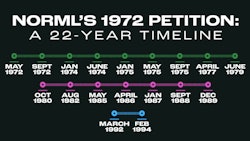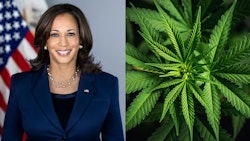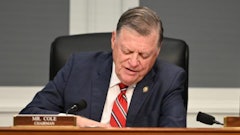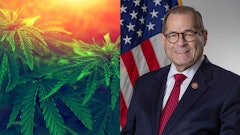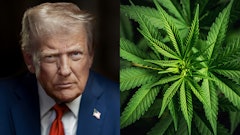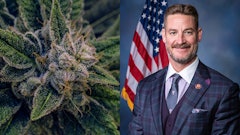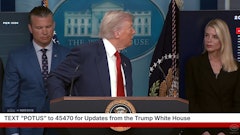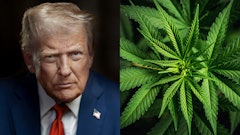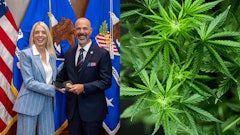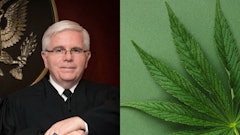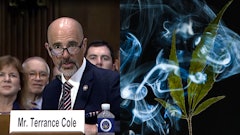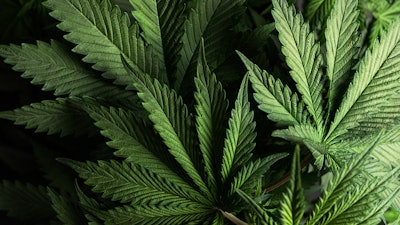
The prohibitionist argument that law enforcement officials oppose cannabis reform is not one that has ubiquitous standing in the U.S.
In the latest push to reschedule cannabis, 32 former police chiefs, sheriffs, federal and state prosecutors, and correctional officials from throughout the country signed a Feb. 22 letter to President Joe Biden stating their case for reforming federal laws on the plant to better align with the majority of states as well as the majority opinion of Americans.
The letter was sent by Law Enforcement Leaders to Reduce Crime and Incarceration (LEL), a national coalition of roughly 200 members who push for changes to laws and practices that more effectively fight crime while reducing unnecessary imprisonment.
The 32 signees wrote to Biden that they are concerned with the conflict between state and federal laws on cannabis as it complicates law enforcement officials’ ability to “respond effectively” to pressing public safety challenges.
“This conflict between federal and state laws has also allowed an unregulated cannabis market to gain footing across the United States,” they wrote. “Alarmingly, we have seen cases in states like California and Oklahoma where sophisticated yet unlicensed operations are tied to organized criminal enterprises. This unregulated commerce thus poses a serious risk to public safety in communities around the country, through such connections to organized crime and the absence of oversight.”
Notably, LEL’s membership includes two officials tied to the Drug Enforcement Administration (DEA), including current DEA Administrator Anne Milgram, who is charged with overseeing the agency’s rescheduling review following an August 2023 recommendation from the U.S. Department of Health and Human Services (HHS) that the plant be relisted from Schedule I to Schedule III under the Controlled Substances Act.
RELATED: Cannabis Rescheduling Document Details Rationale For Schedule III Recommendation
The other LEL member with DEA ties is Robert Stutman, a former special agent in charge of the DEA’s New York field division.
Neither Milgram nor Stutman signed the Feb. 22 LEL letter to Biden.
“We believe that reclassification under schedule III would be an important step to help both federal and state law enforcement better prioritize limited public safety resources,” the 32 LEL signees wrote. “They can focus efforts on working together to combat the harms that arise from unregulated cannabis markets. Moreover, rescheduling would also allow legal markets to compete on a level playing field potentially leading to greater reinvestments in critical programs that can bolster public safety.”
Although Biden directed HHS Secretary Xavier Becerra and Attorney General Merrick Garland in October 2022 to initiate an administrative process to review how cannabis is scheduled under federal law, the final authority for rescheduling in the executive branch of government lies with the DEA.
The Feb. 22 letter from LEL also included an attached letter from six signees connected to some of the nation’s largest Veterans Service Organizations (VSOs) who also are advocating for a Schedule III cannabis classification under the CSA. They penned a separate Feb. 16 letter to Milgram and Garland.
“The men and women who served in the U.S. Armed Forces often face difficult physical and mental challenges upon returning home,” they wrote. “As such, we hope that in treating the wounds of war—both visible and invisible—that our servicemembers and veterans would have access to the widest array of possible treatments.
“The recommendation by HHS to move cannabis to Schedule III reflects a growing acknowledgement of the accepted medical use and potential therapeutic benefits of cannabis products. As organizations dedicated to advocating for the well-being of our veterans, we believe the recommendation of Schedule III will open greater access to the alternative medicines that our nation’s heroes demand and deserve.”
The six signees represent the following VSOs:
- Iraq and Afghanistan Veterans of America
- American Veterans (AMVETS)
- American G.I. Forum
- The American Legion
- Blinded Veterans Association
- Minority Veterans of America
Their letter comes at a time when the U.S. Department of Veterans Affairs (VA)—which, among many services, offers health care to veterans—does not recommend or prescribe medical cannabis to those in the Veterans Health Administration (VHA) system. As such, many veterans remain uncomfortable discussing cannabis use with their VA providers “due to fear of retribution,” the signees wrote.
Also, their letter comes at a time when 60% of veterans support adult-use cannabis legalization at the federal level, according to a January 2024 poll conducted by Ohio State University’s Drug Enforcement and Policy Center.
Meanwhile, 82% of veterans support medical cannabis as a federally legalized treatment option, according to an American Legion survey.
“The federal government should not be denying the voice of its veterans nor their desire to have equal access to medical treatments afforded to their fellow citizens in states with legal programs are able to enjoy outside of the VHA system,” they wrote. “The sooner the DEA moves forward with a reclassification of cannabis, the sooner it could potentially be integrated into the VHA."











